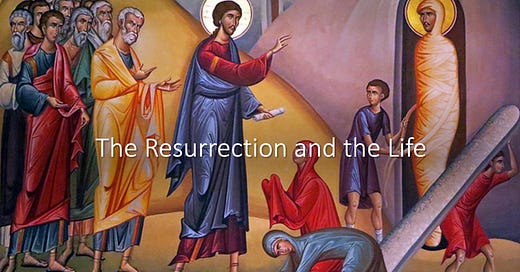Ezekiel 37:12-14; Romans 8:8-11; John 11:1-45
The theme of today's liturgy of the word focuses on the central truth of our faith: resurrection. Prophet Ezekiel refers to it, today's Gospel presents it and Saint Paul proclaims it: "If the Spirit of him who raised Jesus from the dead dwells in you, he who raised Christ Jesus from the dead will also give life to your mortal bodies through his Spirit who dwells in you"(Rom. 8:11).
The story of raising Lazarus to life is one of the most moving stories in the Gospel. Jesus is in the desert, on the other side of the Jordan, where he took refuge from the Jewish authorities (John 10:39-40; 11:8). At the same time in Bethany, near Jerusalem, his friend Lazarus got ill. Martha and Mary informed Jesus about it but He did not go immediately. Then, after two days, Jesus knew that Lazarus had died.
"Lord, if you had been here, my brother would not have died" (John 11:21,32). The one who opened the eyes of the blind could keep Lazarus from dying (John 11:37). "But now I know that God will give you everything you ask God for" (John 11:22). Martha's Christology was excellent. She believed that Jesus is "the Christ, the Son of God, who is coming into the world" (John 11:27). Her eschatology was also impeccable: she believed in the resurrection of the dead on the last day. What she does not realize is the fact that the One who is "the Resurrection and the Life" (John 11:25) stands in front of her. "Your brother will rise again" (John 11:23). In Jesus the future becomes present and the last day becomes today.
How did Jesus feel when he saw Mary and the Jews crying (John 11:33,38)? Was He "deeply moved" or "perturbed"? The same Greek word in the book of Lamentation and the Gospel of Mark refers to "indignation" (Lam. 2:6; Mark 14:5). It seems that Jesus is "angry" with death for hurting those he loves (John 11:5; Rev 1:5). Death was not in God's plans (Wis. 2:23-24), on the contrary, it is the last enemy of God to be destroyed (1 Cor. 15:26).
The Gospels contain three miracles of raising the dead back to life. The daughter of Jairus was raised immediately after her death (Mark 5: 35-42), the son of the widow of Nam was raised on the way to the cemetery (Luke 7: 11-15), and Lazarus was raised after being four days in the grave. Those different timings reveal the power that Jesus has over death. But there is one surprising detail. In two cases, Jesus commands the dead to "arise" (Mark 5:41; Luke 7:14), but the command given to Lazarus is different: "come out" (John 11:43). Why?
After receiving the message that Lazarus was sick Jesus "stayed two days longer in the place where he was" (John 11:6). On the one hand, going back to Judea was dangerous (John 11:8,16), but on the other hand, Jesus loved Lazarus, Martha, and Mary (John 11:5). On the one hand, Jesus immediately knew that the sickness of Lazarus will bring glory to God (John 11:4) but on the other hand, the timing of revealing that glory was also crucial.
"Take away the stone", says Jesus, but Martha replies: "Lord, by this time there will be an odor" (John 11:39). And yet when the stone was taken away, John does not tell us that there was a smell. Instead, we hear Jesus' thanksgiving prayer: "Father, I thank you that you have heard me" (John 11: 41-42). When did the Father hear Jesus' prayer? During those two days in the desert? How did Jesus know that the Father heard Him? Because there was no odor? Something truly incredible had to take place inside that tomb before Jesus called: "Lazarus, come out".
The raising of Lazarus leads many Jews to believe in Jesus (John 11:45). To believe in the resurrection and eternal life is to believe in Jesus, who is the Resurrection and eternal Life (1 John 1:2).




